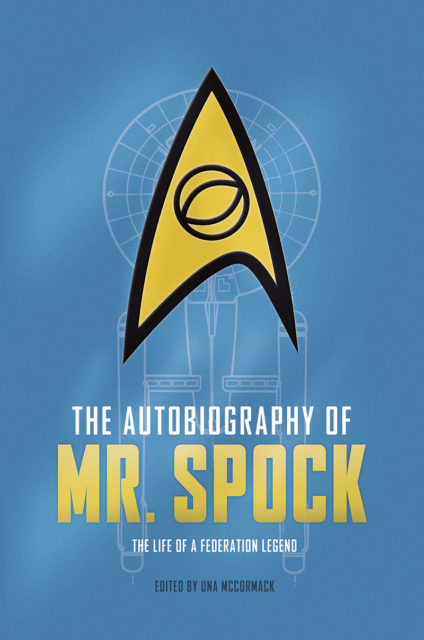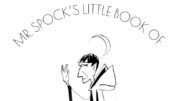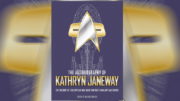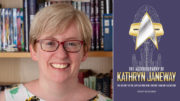Given the various versions of Spock we’ve seen since he made his TV debut in 1966, Una McCormack had quite the challenge ahead of her with The Autobiography of Mr. Spock, a book once planned for 2018 with writer David A. Goodman. The addition of Ethan Peck’s Spock to Star Trek: Discovery and now the upcoming Strange New Worlds series adds serious complications to anyone attempting to chronicle the character’s life, but McCormack, for the most part, handles them deftly.
Spock’s book of wisdom
The conceit of The Autobiography of Mr. Spock is that it’s Spock’s t’san a’lat: a book of wisdom Vulcans write to pass along to those who come after them. McCormack’s Spock addresses his book to Jean-Luc Picard, a choice that makes perfect sense after the events in TNG’s “Unification,” in which Spock and Picard not only meet, but mind meld. Spock writes his wisdom book before he is to head out on a fateful (and famous) journey, and describes his life, thoughts, and motivations from early childhood through to his decision to try to forestall the events that set off the Kelvin movies.
The trick here (and one that McCormack achieved to perfection in her Kathryn Janeway autobiography) is to have the reader hear the story that unfolds in the character’s, and therefore the actor’s, voice—but which one? Zachary Quinto, the Spock of the J.J. Abrams movies, is not a contender as the autobiography ends before his adventures begin, but there was still a juggling act for this reader, who went back and forth between Ethan Peck and Leonard Nimoy throughout, depending on what part of the story was being told. As the producers of the still-unseen Strange New Worlds work to bridge the gap between the Spock of Discovery and the one of The Original Series, McCormack does her best to connect the dots, and mostly succeeds.
Connecting the Spocks
McCormack excels at tying the disparate parts of Spock’s life together, creating connections between what we knew of him on TOS through the movies and his appearance on TNG, and then on Discovery. Sybok and Michael Burnham are no longer afterthoughts in Spock’s history, and McCormack makes it both understandable and yes—logical—that they were both prominent figures in his life he chose not to discuss with even his closest of colleagues and friends.
Occasionally, the arduous task of joining the TV universes together feels like a bit of efficiency, especially when it comes time to discuss the Red Angel and the Sphere Data, but McCormack is able to tap into the emotional heart of these stories once she’s past the obstacle of getting all the details down. When she’s free to create her own details, like Spock’s description of being tested by Captain Pike and Number One on his first tour aboard the Enterprise that will remind viewers of the Short Treks episode “Ask Not,” the story comes alive.
The events of the TOS movies are where Nimoy’s voice emerges most clearly. The details we all know so well aren’t described so much as enhanced with deeper, personal insights only Spock could have. McCormack does an excellent job of filling in some of the gaps, like why Spock became an instructor at the Academy, what drove him to attempt the Kolinahr, and what it was like on Vulcan after his katra was reunited with the body found on the Genesis planet. There are figures from his history who get their due; I’ll leave that as a surprise for those who have yet to read the book.
Highlights: Amanda, McCoy, Sarek, and Saavik
The book shines brightest in its exploration of Vulcan life and culture, and in the way it addresses a handful of specific characters: Spock’s father Sarek, his friend Leonard McCoy, his protégé Saavik, and most of all, his mother Amanda, whose influence upon her son is finally given the importance it deserves. We understand why Amanda married Sarek, we see how she raised both Spock and Michael and how integral she was to their development. We finally see how Spock’s love and respect for her is essential to the person he becomes. Amanda is so fully drawn (and such a lovely combination of the strengths brought to the onscreen role by both Jane Wyatt and Mia Kirschner) that I want to lobby McCormack to take on The Autobiography of Amanda Grayson next.
The chapter on McCoy is utterly delightful, capturing the doctor’s cantankerous nature, his steadfast loyalty, and most of all, his unforgettable personality. (After McCormack finishes the Amanda book, she should take on McCoy, please.) Saavik’s origin story is told in detail, fleshing out an already intriguing character and enhancing the bond with Spock seen in The Wrath of Khan and The Search for Spock. Spock and Sarek’s complex relationship feels nuanced and real, giving extra gravitas to Spock’s gratitude for Picard’s role in bringing father and son together after Sarek’s death.
The Missing Piece: James T. Kirk
So what’s missing? For this reader, it’s James T. Kirk. Yes, Spock speaks of his love and admiration for him, but but does not discuss the friendship in detail, a surprising omission from someone who grew up so lonely and found the deepest connection of his adult life with a human—and is telling his story to one. Their extraordinary relationship drove Star Trek’s stories, created a mythology unto itself, and may be one of the greatest fictional friendships of all time. The lack of a deeper look at how that affected Spock, as we know it did, feels like a hole in his story. We get a hint that perhaps his emotional attachment makes it difficult for him to write about it, but it still left me unsatisfied. These two “brothers” needed to have their story told.
That said, the book is an engaging read as well as, to use the obvious word, a fascinating one. We learn about everything from Spock’s Academy days to his time living among Romulans, we spend time with him at the home of Amanda’s parents on Earth, and whether you’re hearing the story in Ethan Peck’s voice, Leonard Nimoy’s, or one you provide for yourself, it remains, quintessentially, Spock’s.
On sale now
Buy The Autobiography of Mr. Spock, it was released today, September 14th. You can pick it up at Amazon in hardcover for $20.99, in paperback for $14.95, or e-book Kindle e-book for $10.95.
Find more news and reviews of Star Trek books at TrekMovie.com.
DISCLAIMER: We may link to products to buy on Amazon in our articles; these are customized affiliate links that support TrekMovie by earning a small commission when you purchase through them.







Excellent review, Laurie! Well done. Looking forward to reading the book!
I honestly like the fact that Kirk is an elephant in the living room as it were. Spock doesn’t want to admit that his best friend is dead, and deeply loved him, character development aside he’s been raised to be repressed.
I do think this was the intention! But I wanted more.
It makes sense that the direction would have been for Una not to have gone further on the Spock-Kirk friendship beyond what was in canon.
SNW may indirectly give us a new perspective on that relationship, and this novel should be completely neutral on that.
“someone who grew up so lonely”
Yes, which was the original mythology, very powerful, until decades later, hack writers started adding siblings to the mix. Watch, years from now, some moron involved in future productions will think to add another brother/sister to the mix, in order to come up with the latest “surprise”. I hate it when untalented people are put in a position of authority, and end up screwing with our beloved Star Trek franchise.
Oh, for crying out loud.
Sybok seems to have been a sore point for a while now???
Sybok…..Michael……Spock went from being an only child to his home looking like a booth at Denny’s on Pancake Day!
Okay, I admit I spit my coffee on that one. Bravo!
Thanks, Maltz! TOY CHOO!!
And it’s just so unnecessary. Sybok and Michael would both have worked far better as characters without any connection to Spock or Sarek. TNG realised that making explicit connections to TOS characters (like if they’d had descendants of the characters as main characters for example) would make the Trek universe feel too insular. If only recent Trek writers had as much wisdom or awareness.
In the book, he’s still lonely. He doesn’t grow up with Sybok and Michael at his side all the time and McCormack finds a way to reconcile all of these stories without compromising Spock’s isolation as a half Human/half Vulcan, the events of “Yesteryear,” etc. It all still works.
Laurie, I understand. Not to overstate it, but it’s kind of like reading the Bible, then, many years later, hearing that Jesus had a brother and a sister. Oh, don’t concern yourself, they were busy fishing and didn’t interact with their brother much! Yikes! :<)
Yes cos Spock never dropped a bombshell (twice) of someone he was either married or related to in the original show.
Right. Kirk didn’t know who Spock’s parents were when they were literally standing right in front of him. I wrote an editorial for TrekMovie when Discovery was first announced about how I didn’t have trouble buying the idea that Spock had never mentioned a sister. The concept itself made sense to me. I confess I’m nervous about how Strange New Worlds is going to handle his character (which we discussed on the All Access podcast last week), but I stand by the opinion that the secret siblings aren’t really so hard to believe.
Laurie, I am right there with you about Spock & Michael.
Yes ! I agree with you Harry ! the Star Trek Pool has now been tainted by the uncreative opportunistic Hacks . Any longtime fan knows Spock never had a black Sista! It’s just politically-correct hyped-up drivel to excite the bored viewers . And now those same opportunists are poisoning the deep wellspring of canon as well !
How Saavik didn’t end up with a larger role in Trek is beyond me.
Kirstie Alley demanded more money and was fired. Robin Curtis didn’t resonate with fans compared to Alley, so they dropped her, too. It really is as simple as that. She was supposed to come back in Star Trek VI as a traitor, but instead the character of Valeris was created.
If they ever make a post-TUC TV show I would certainly like to see the character back in some form. She could be Captain of her own ship by then.
Curtis gave us a real Vulcan, and her performance is massively underated. Alley and Cattrell gave us “sex kitten Vulcans,” which is what the studio suits, and a lot of Trek fans wanted, unfortunately.
Curtis’s performance was awful. ZERO chemistry w/ her fellow actors.
Not talking about Kirk much is a surprising omission indeed. Admittedly, I’m more interested in hearing his perspective on McCoy, but I would expect him to explore his friendship and lessons learned from Kirk.
The McCoy stuff is gold.
Unification was the most disappointing Trek ep ever given all the hype. How bizarre that the author uses that boring crapfest ep as the basis for Spock to dedicate his autobiography to Picard (and also given Spock knew Picard for like 20 minutes…lol) — and then to read that the author is really limited on his friendship and adventures with Kirk as well, which should be the heart of this bio. This makes my buying decision easy — no thanks!
Moral of the story — never have a Berman era-centric Trek author write a TOS-centric book. Where is Diane Duane when we need her?
I don’t think she’s with us anymore , M . We’re now in the new throw-away era .
Is there going to be a Dr. Piper in SNW?
First name Pied?
(runs and hides)
A Mark against you for that.
Not before the final season, I would assume.